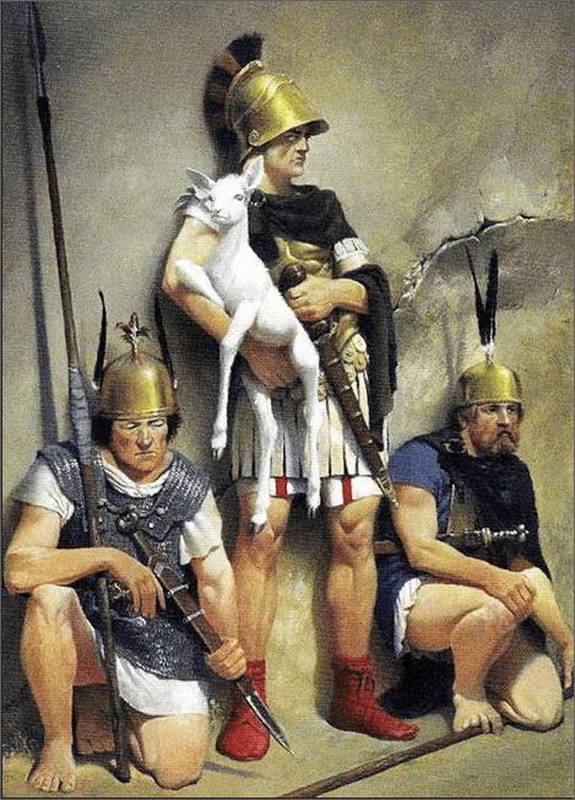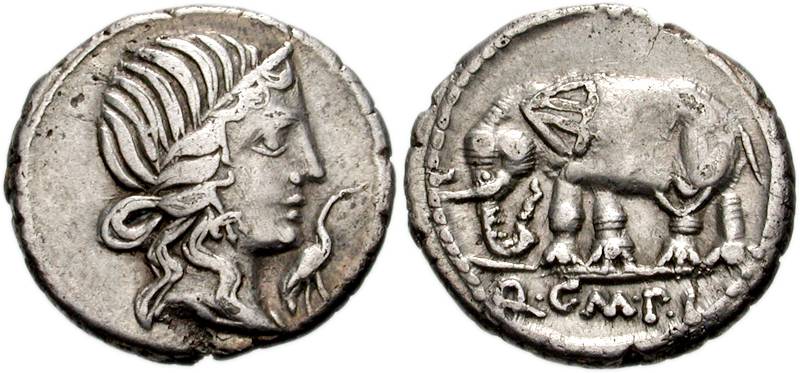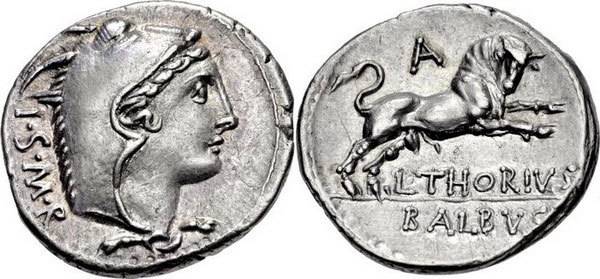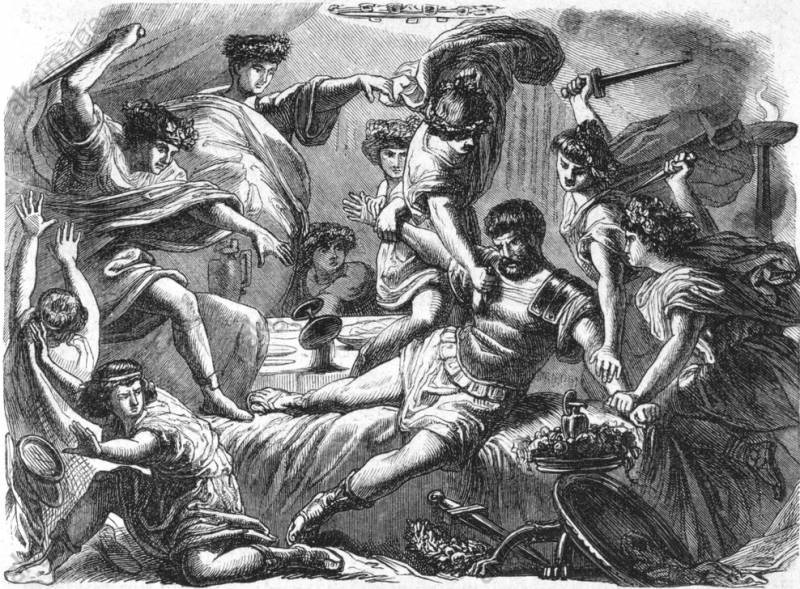Sertorian War

Sertorius army soldier and Lusitanian warrior on a modern reconstruction of Pinto and Shumate
В previous article it was told about the origin of Quintus Sertorius, the beginning of his military service, participation in the Allied War and civil wars.
At the most tense moment of the Second Civil War, Sertorius was actually sent into honorable exile - he was appointed proconsul of Near Spain - "the militant province, whose infidelity was feared by the Marians." Sulla eventually won the civil war, and Sertorius, who was no longer destined to return to either Rome or Italy, was in for great glory and death at the hands of a traitor. But let's not get ahead of ourselves and continue our story.
First victories in Spain
As we remember, Sertorius, who was in Mauritania, was invited to Spain by representatives of the Lusitanian tribe, who needed a good commander for the war with Rome. Teaming up with the Lusitanians, Sertorius first defeated the troops of the governor of Farther Spain, Lucius Fufidia, then the Sullan proconsul of Nearer Spain, Mark Domitius Calvin. But that was only the beginning of the war.
Sertorius' big problem, meanwhile, was the indiscipline of his Spanish allies. They often had not to order, but to explain the expediency of orders. Once, when the Lusitanians, contrary to his opinion, attacked the Roman army and were defeated, Sertorius played a whole spectacle in front of his army. He ordered to bring out two horses - a large and strong one was led by a frail man, a weak one - by a big man. By order of Sertorius, the “hero” tried to immediately pull out the entire tail of a weak horse, while the “goal” began to pull out one hair from the tail of a strong horse.
The result was quite expected: unlike the "weakling", the big man did not cope with his task. So Sertorius convinced the Lusitanians that one should not strive to enter into big battles with the Romans - it is easier to break their armies in parts. This episode is reported by Plutarch, Frontinus, and some other authors.

Hans Holbein the Younger. Episode with two horses
In addition to rational methods, Sertorius also used mystical ones. Everyone knew his famous white fallow deer, an animal considered sacred in the Iberian Peninsula. This doe was brought to him as a deer by a certain Span, and Sertorius in front of everyone declared it a "gift of Diana." Plutarch reports:

Sertorius white doe, modern illustration
The skillful use of this animal significantly increased the authority of the commander.
Quintus Sertorius vs Metellus Pius
Historians believe that at first the forces of Sertorius did not exceed 8 thousand people. Nevertheless, he acted so successfully that Sulla was forced to send against him one of the most experienced Roman generals of the time - Quintus Caecilius Metellus Pius.

Silver denarius of Quintus Caecilius Metellus Pius, 81 BC e.
Sometimes one has to read that by that time Metellus was already a lazy and lack of initiative old man. However, he was only about 6 years older than Sertorius, who considered Metellus to be a more distinguished military leader than his own best general, Lucius Hirtulei.
Significantly inferior to Metellus in strength, Sertorius avoided big battles, but constantly harassed his troops, set up ambushes, and disrupted communications. An example is the siege by Roman troops of the city of Langobriga, which Plutarch tells about. Sertorius managed to organize the supply of the besieged city with water, and he brought the most combat-ready men out of it in advance. By adding them to his army, he constantly harassed the Romans. After Sertorius defeated the six thousandth detachment of the legate Aquinas, who was supposed to deliver food for the main army, the Romans were forced to withdraw from the city.
Metellus nevertheless managed to oust Sertorius from part of the territory of Baetica, but there was no talk of defeat. Questor Sertorius Lucius Girtuley defeated the army of the governor of Farther Spain, Domitius Calvin, with the help of which Metellus planned to take the territory controlled by Sertorius "in pincers". And Sertorius defeated the legate Metellus Thorius Balbus. At the same time, both Domitius Calvin and Thorius Balba fell in battle.
However, some researchers believe that the troops of Calvin and Balba managed to unite and were defeated by Lucius Hirtuleius. Either way, the rebels now controlled most of Middle Spain.
True, there is no information that they managed to capture Roman cities (colonia civium romanorum). The exception was Valentia (Valencia), but researchers are still arguing whether it was at that time a Roman city.
Sertorius, by the way, continued to reduce taxes, gathered representatives of the communities, minted his own coin and regularly paid the tribes for the supply of food and equipment.

Coin of Quintus Sertorius
Gnaeus Pompey - the new enemy of Sertorius

Bust of Pompey Magna, circa 20 BC e.
In 78 BC. e. the troops of the proconsul of Narbonne Gaul, Lucius Manlius, entered Middle Spain - 3 legions and about one and a half thousand horsemen. This army was also defeated by Hirtuleios. The Romans had to send another army to the Iberian Peninsula, led by Gnaeus Pompey, whom Sertorius called "the student of Sulla." Before that, Pompey and Consul Catulus suppressed the uprising of another consul in Italy - Marcus Aemilius Lepidus, who spoke under anti-Sullan slogans (it is curious that it was Pompey who supported Lepidus in the elections of consuls). The remnants of the army of Lepidus also came to the Pyrenees, who joined Sertorius. Their commander was Mark Perperna, who would later lead a plot against Sertorius.
According to the most reliable version, it was at that time that Sertorius, having learned about the death of his mother, did not leave the tent for 7 days and did not give any orders. Companions with great difficulty managed to persuade him to return to business. Some believe that this demarche of Sertorius was the reaction of the commander to the actions of Perperna and the Romans who arrived with him (much more noble than the rebellious proconsul): having frightened everyone with his refusal of the supreme command, he managed to retain power.
But let's get back to Pompey, who, on his way to Spain, had to "appease" the Gauls, who grew bolder after the death of proconsul Lucius Manlius. The future opponent of Caesar arrived in Spain at the end of 77 or the beginning of 76 BC. e. On the territory of Iberia, his army entered into hostilities in 76 BC. e. Some tribes and cities went over to his side, including Lavron, who was immediately besieged by Sertorius. In the same year, the troops of Quaestor Pompey Memmius landed in New Carthage, but they were blocked by the rebels.
Pompey decided to release Lavron - and suffered a painful defeat. Sertorius attacked a significant detachment that went for food, and then defeated the Roman legion, which tried to come to the aid of the foragers. Pompey did not dare to move the main army into battle, as he saw the heavily armed foot soldiers of Sertorius, who took up positions on the hills and were ready to strike from the rear.
As a result, the Sertorians even captured the convoy of the Roman army. Lavron was taken by storm, and here an incident occurred, which Appian reports: one of the soldiers raped a local resident, who then gouged out her own eyes. Sertorius, who learned about this, ordered the execution of the entire cohort in which the rapist served - despite the fact that it consisted of Roman citizens.
It is believed that these were the soldiers who came with Perperna: Sertorius thus “put them in their place” and showed that he would demand the strictest discipline and unconditional submission.
Some modern researchers believe that in this case we are still talking not about the total extermination of the cohort, but about decimation - the execution of every tenth warrior. But even this was an extraordinary and very heavy punishment. And Pompey was forced to retreat to the Pyrenees. This defeat severely undermined his authority, and it was now said of Pompey that he "except that he just warmed himself by the flames that devoured the allied city, but did not come to the rescue."
Sertorius moved the fighting to Celtiberia, capturing the strategically important city of Contrebia of Luzon there. After that, he gathered representatives of the communities that supported him in Castra Elia, where he told them about his successes and thanked them for their help. The soldiers were given a new weapon and paid a salary.
The continuation of the war
In the spring of 75 BC. e. Sertorius went on a successful campaign against the tribes of the Berons and Autricons. However, Pompey at this time moved his army across the Iber River and moved to Valentia, capturing, according to some sources, the city of Sagunt. At Valentia, he defeated the troops of Perperna and another Sertorian commander, Herennius, who died in battle. Valentia was captured and destroyed.
Having received news of this catastrophe, Sertorius led his army to the sea. Having connected his troops with parts of Perperna, he entered into battle with Pompey. The flank commanded by Pompey was overthrown, the wounded Roman commander fled, his horse with golden phalers and precious harness became the prey of Sertorius's cavalrymen.
But on the other flank of the rebels, the Roman commander Aphranius (the future proconsul of Middle Spain) successfully attacked - the soldiers of Aphranius even broke into the camp and began to rob it, but were driven back during a counterattack led by Sertorius. Sertorius could not win a final victory, because news came of the approach of Metellus's troops.
Plutarch states that Sertorius then said:
Metellus defeated the army of Hirtuleius, who entered the battle, violating the order of the commander-in-chief. Now Sertorius had to withdraw from the eastern coast of the Mediterranean Sea inland - otherwise his troops would be between the two Roman armies.
He went to the lands of the Celtiberian tribe, followed by the armies of the Roman proconsuls. Unable to hold out in Near Celtiberia, the rebels withdrew to Segontia (Far Celtiberia, the territory of the Arevaci loyal to Sertorius). Having won a victory at Sukron, Sertorius, according to Plutarch, entered into negotiations, offering to stop the fight, subject to permission to return to Italy. However, this proposal was not accepted, and at Segontia the opposing armies entered into a new battle.
First, Sertorius defeated Pompey, who lost his son-in-law in this battle. But Metellus acted much more successfully against Perperna. Then Sertorius also entered the battle with Metellus, the Roman commander was wounded, but the victory remained with his army.
Sertorius was forced to retreat to the mountain fortress of Clunia, which the Romans could not take. Part of the army of Sertorius operated in the mountains, where he received significant reinforcements. Upon learning of this, the rebel leader organized a breakthrough of enemy lines, entering the operational space. Now he launched a guerrilla war against the Romans, which forced the proconsuls to withdraw troops to winter quarters: Metellus went to Narbonne Gaul, Pompey remained in Spain - in the lands of the Vaccaei tribe.
Many of Sertorius's former allies recognized Roman authority, but the Arevaci, Vasconi, Vaccei, and Lusitani tribes were determined to continue the fight. Defectors appeared among the Italians and Romans, but most of them still remained loyal to their commander. However, Sertorius no longer trusted them, and his guards now consisted of warriors from local tribes.
Under these conditions, Sertorius entered into an alliance with the Pontic king Mithridates VI Eupator, whose ambassadors arrived in Spain. In exchange for sums of money and ships, Sertorius sent Mithridates a number of his officers, who were to become "military advisers" and instructors. In addition, he agreed to cede to Mithridates what he did not possess - Bithynia, Cappadocia, Galatia and Paphlagonia, some say that also the Roman province of Asia.
Mithridates understood that Sertorius' recognition of his right to these territories meant almost nothing, however, the more successfully this rebellious proconsul fought, the more forces and means the Roman Republic would have to allocate to fight him.
But did it come to real help? Even the Roman authors did not have a common opinion on this matter. Therefore, we can conclude that if there was help, then, apparently, not too significant.
The fighting resumed in the spring of 74 BC. e. and proceeded with varying degrees of success. Neither side received a decisive advantage, but Metellus nevertheless announced his victory, and the soldiers proclaimed him emperor. This time, with the onset of winter, Pompey left for Garbonne Gaul, and Metellus stationed his troops in Far Spain.
In the spring of 73 BC. e. the war resumed. Senate proconsuls pressed the rebels, but could not beat them. Sertorius continued to control Lusitania, Far Celtiberia, the territory of the tribes of the northern Vaccaei, Ilergets and Vascons. He owned the cities of Osca, Clunia, Dianius, Termess, Pallantia, Calagurris and Uxamu.
Some authors report that the character of Sertorius at this time changed for the worse. The commander became suspicious and showed despotic traits that had not been noticed before.
Assassination of Sertorius
As we remember, in the rebel army, friction between the Italics and the Romans and the local natives grew. Moreover, Sertorius no longer trusted the Romans, especially after in 73 BC. e. a conspiracy against him was uncovered. The conspirators were executed, but Perperna survived, who, fearing to become a victim of a new massacre, decided to act in advance. Sertorius was invited by him to a feast and killed.

W. Wagner. "The Assassination of Sertorius"
Diodorus and Appian believed that the tyrannical behavior of Sertorius was the main reason for the conspiracy and murder. Plutarch, on the other hand, argued that it was the lust for power and ambition of Perperna, who could not come to terms with the fact that he, a descendant of a noble Roman family, was forced to obey some native of the provincial Nursia. However, these versions, perhaps, do not exclude, but complement each other.
According to many authors, the soldiers were outraged by the murder of their commander, but Perperna managed to restore order. The indignation of the Spanish allies was even stronger, some tribes even went over to the side of the generals of the Senate.
The reaction of Metellus is also characteristic, who, having learned about the death of Sertorius, withdrew his troops, believing that Pompey alone would now cope with the rebels. And so it all happened: the army of Perperna was ambushed and was completely defeated. The captured Perperna promised to give out Sertorius's correspondence with the noble citizens of Rome, but Pompey ordered his execution, and burned all the documents without reading. In Rome, this act of his caused universal approval.
Soon after, all the main pockets of resistance in Spain were crushed, but individual tribes continued to resist until the end of 70 BC. e. Aphranius, who replaced Pompey as proconsul of Near Spain, already fought with them. Until the age of 71, Metellus fought with the Lusitanians. And Pompey in 72 BC. e. with his army he returned to Italy, where he managed to take part in the defeat of the last detachments of the army of the deceased Spartacus. Having defeated one of them, numbering about 6 thousand people, he wrote to the Senate without "false modesty":
Information